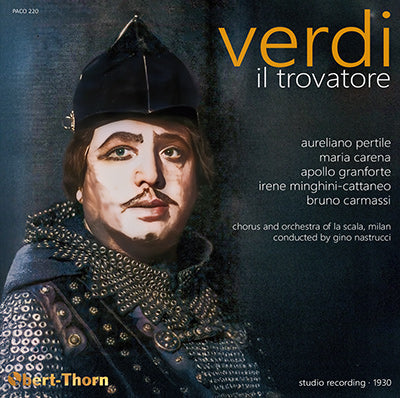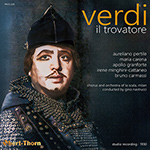
This album is included in the following sets:
This set contains the following albums:
- Producer's Note
- Full Track Listing
- Cover Art
[H]ere are some of the finest voices from the 30’s, conveying the drama and immediacy of a live performance without the attendant disadvantages of a live recording. The sound is particularly striking for its age – and you can hear a quartet of unparalleled splendour. I had never heard of Maria Carena, but she is a proper singer of the old school, who occasionally reminds me of Muzio without quite the beauty of that greatest of sopranos. Both vocal registers are fully developed and she knows exactly what she is doing; her technique is excellent. The other singers are better known: Pertile (a Toscanini favourite) occasionally allows his vibrato to get away from him and produce the effect of singing sharp, and Granforte makes wonderfully impressive sounds without much subtlety, but they are nonetheless mighty impressive. Minghini-Cattaneo is a paragon among Azucenas; as good as any I have ever heard. There are numerous cuts, of course, and Pertile transposes “Di quella pira” down […] which is a bit naughty and robs it of some excitement – but that is hardly unprecedented. Sabajno’s conducting fairly rattles along but that’s what this warhorse needs – and he is by no means insensitive.
From “A selective survey of Verdi’s Il Trovatore” by Ralph Moore, MusicWeb International, July, 2021
Along with the 1928 set of Aïda (reissued on Pristine PACO 196), this was one of the most strongly cast complete operas in HMV’s prewar series. Maria Carena (1891-1966) made her debut as Leonora, and studied the role under Toscanini. Critic Herman Klein compared Aureliano Pertile (1885-1952) to Tamagno and Caruso when he appeared as Manrico in London in 1927. Apollo Granforte (1886-1975) was not a regular at La Scala, but makes a splendid villain here, and Irene Minghini-Catteneo (1892-1944) was considered one of the best Azucenas in Italy.
While Carlo Sabajno was credited as the conductor on the original set (and all “official” EMI LP reissues), research done by John W. N. Francis established that all but two sides (matrices CF 3552-1 and CF 3575-1; here, CD 1, Tracks 9-10 and 13-14) were actually “ghost-conducted” by his assistant, Gino Nastrucci, who also led various remake sides for Sabajno’s HMV sets of Tosca, La Traviata, Carmen and Otello.
Mark Obert-Thorn
VERDI Il Trovatore
CD 1 (61:32)
ACT ONE
SCENE 1
1. All’erta, all’erta (3:01)
31 Oct 30; CF 3587-2 (HMV D 1952)
2. Di due figli (4:00)
31 Oct 30; CF 3588-2 (HMV D 1952)
3. E il padre? (3:08)
SCENE 2
4. Che più t’arresti (1:20)
21 Nov 30; CF 3637-2 (HMV D 1953)
5. Come d’aurato sogno (0:34)
6. Tacea la notte placida (3:18)
13 Nov 30; CF 3616-1 (HMV D 1953)
7. Quanto narrasti (0:49)
8. Di tale amor (1:28)
13 Nov 30; CF 3618-2 (HMV D 1954)
9. Tace la notte! (1:47)
10. Deserto sulla terra (1:31)
24 Oct 30; CF 3552-1 (HMV D 1954)
11. Non m’inganno (1:58)
12. Di geloso amor sprezzato (2:27)
24 Nov 30; CF 3551-5 (HMV D 1955)
ACT TWO
SCENE 1
13. Vedi! Le fosche notturne spoglie (2:57)
14. Stride la vampa! (part 1) (1:21)
29 Oct 30; CF 3575-1 (HMV D 1955)
15. Stride la vampa! (part 2) (2:53)
16. Soli or siamo (0:56)
19 Nov 30; CF 3633-2 (HMV D 1956)
17. Condotta ell’era in ceppi (4:17)
18 Nov 30; CF 3631-2 (HMV D 1956)
18. Non son tuo figlio? (2:02)
19. Mal reggendo all’aspro assalto (2:52)
18 Nov 30; CF 3632-2 (HMV D 1957)
20. L’usato messo, Ruiz invia (1:16)
21. Perigliarti ancor languente (1:55)
19 Nov 30; CF 3634-2 (HMV D 1957)
SCENE 2
22. Tutto è deserto (1:25)
23. Il balen del suo sorriso (3:11)
3 Nov 30; CF 3593-2 (HMV D 1958)
24. Qual suono! (0:30)
25. Ardir! Andiam! . . . Per me ora fatale (2:13)
26 Nov 30; CF 3655-1 (HMV D 1958)
26. Ah! se l’error t’ingombra (2:06)
27. Perchè piangete? (2:07)
21 Nov 30; CF 3639-2 (HMV D 1959)
28. E deggio e posso crederlo? (3:56)
21 Nov 30; CF 3648-2 (HMV D 1959)
CD 2
(52:36)
ACT THREE
SCENE 1
1. Or co’ dadi, ma fra poco (2:00)
2. Squilli, echeggi la tromba guerriera (2:15)
31 Oct 30; CF 3586-1 (HMV D 1960)
3. In braccio al mio rival! (2:04)
30 Oct 30; CF 3580-2 (HMV D 1960)
4. Giorni poveri vivea (4:17)
30 Oct 30; CF 3581-3 (HMV D 1961)
SCENE 2
5. Quale d’armi fragor poc’anzi intesi? (1:55)
6. Ah, si ben mio (2:50)
25 Nov 30; CF 3636-2 (HMV D 1961)
7. Manrico (0:49)
8. Di quella pira (2:12)
21 Nov 30; CF 3638-1 (HMV D 1962)
ACT FOUR
SCENE 1
9. Siam giunti (2:39)
22 Nov 30; CF 3640-1 (HMV D 1962)
10. D’amor sull’ali rosee (3:27)
22 Nov 30; CF 3641-1 (HMV D 1963)
11. Miserere (4:48)
24 Nov 30; CF 3649-1 (HMV D 1963)
12. Udiste? (1:42)
13. Mira, di acerbe lagrime (1:51)
17 Nov 30; CF 3630-2 (HMV D 1964)
14. Conte! (1:10)
15. Vivrà! Contende il giubilo (2:06)
20 Nov 30; CF 3635-1 (HMV D 1964)
SCENE 2
16. Madre, non dormi? (4:31)
17 Nov 30; CF 3638-2 (HMV D 1965)
17. Sì, la stanchezza m’opprime (1:19)
18. Ai nostri monti (2:05)
17 Nov 30; CF 3629-1 (HMV D 1965)
19. Che! Non m’inganno! (4:00)
15 Nov 30; CF 3619-2 (HMV D 1966)
20. Ti scosta (4:27)
15 Nov 30; CF 3620-1 (HMV D 1966)
CAST
Manrico - Aureliano Pertile (tenor)
Leonora - Maria Carena (soprano)
Conte di Luna - Apollo Granforte (baritone)
Azucena - Irene Minghini-Cattaneo (mezzo-soprano)
Ferrando - Bruno Carmassi (bass)
Ines - Olga de Franco (soprano)
Ruiz - Giordano Callegari (tenor)
Un vecchio zingaro - Antonio Gelli (bass)
Un messo - Giordano Callegari (tenor)
Orchestra and Chorus of Teatro alla Scala
conducted by Gino Nastrucci
(Vittore Veneziani, chorus master)
Recorded in the Conservatorio, Milan
Producer and Audio Restoration Engineer: Mark Obert-Thorn
Special thanks to Gregor Benko for providing source material and to
Tully Potter for information on the singers.
Cover artwork based on a photograph of Aureliano Pertile as Manrico.
Total duration: 1hr 54:09

